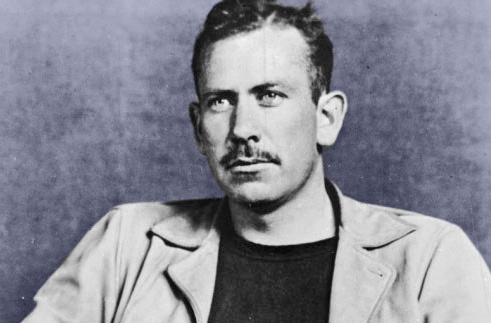
John Steinbeck told the story of the migrant worker, the hobo, and the grocery clerk. He is consequently believed to be a champion of the oppressed and voiceless. Yet he chose his subject matter not in some condescending gesture to the common man; he thought his characters were true heroes of their age, as evidenced in the letter below.
[Montrose]
February 11, 1933
Dear Ballou,
Please don’t mind the pencil. I don’t own a fountain pen. I am lying in the sun, drinking coffee. Of course I could use the typewriter. For the first time in one month it is idle. This is a good day. I shipped mss. to Miss O. this morning. You should get it before very long. I hope you will like it. The book was hellish hard to write. I had been making notes for it for about five years. It will probably be a hard book to sell. Its characters are not “home folks.” They make no more attempt at being sincerely human than the people in the Iliad. Boileau (much like your name) insisted that only gods, kings, and heroes were worth writing about. I firmly believe that. The detailed accounts of the lives of clerks don’t interest me much, unless, of course, the clerk breaks into heroism. But I have no intention of trying to explain my book. It has to do that for itself. I would be sure of its effect if it could be stipulated that the readers read to an obligato of Bach.
There are several things in your letter that I must answer. The Hymn to a God Unknown was, of course, written about three thousand years ago. It must have been chanted, but I know of no music. The disadvantage of setting Sanskrit characters in the end papers is that it would give an Eastern look to the book.
Your letter sounds a bit disconsolate. The working of publishing houses must be nerve wracking, but I should think it would be heartening. More and more competitions going out. And the need for books is leaping, not dropping. I know a French boy who started a haberdashery just before the crash. On all sides of him stores went under but he continued merrily. I went to see him the other day and asked him how he did it. He said, “I come from French peasant stock. We waste nothing. I have very little overhead. Such things as ‘service’ and luxury are killing my competition. If I make a dollar it is my dollar.” If you can hold out for a year without falling in the mess the others have, you will be the “Publisher.” Your method is sane. Knopf says that only 1 percent of the books are sold because of advertising. And advertising is the most expensive item, isn’t it? I can’t tell you how pleased I am to be associated with you.
The Murder I thought might be sold to a pulp if it were cut down. Even a little money would be better than a bunch of grapes.
We are very happy. I need a dog pretty badly. I dreamed of dogs last night. They sat in a circle and looked at me and I wanted all of them. Apparently we are heading for the rocks. The light company is going to turn off the power in a few days, but we don’t care much. The rent is up pretty soon and then we shall move. I don’t know where. It doesn’t matter. My wife says she would much rather go out and meet disaster, than to have it sneak up on her. The attacking force has the advantage. I feel the same way. We’ll get in the car and drive until we can’t buy gasoline any more. Have two more books almost ready to start but a month of messing around won’t hurt. But I do need a dog. Tillie haunts the house terribly.
Please let me hear as soon as you can, what you think of this new book. It was an important piece of work to me. I wanted to make a beautiful and true book.
Sincerely,
John Steinbeck
Notes: Robert O. Ballou was Steinbeck’s editor and publisher at the time. The Ballou house would soon go under, and Steinbeck would take on another editor, Pascal Covici, at Viking.
Steinbeck references Nicolas Boileau, author of L’art poétique, original defender of Classical literary models in seventeenth century France.
From Steinbeck: A Life in Letters. Edited by Elaine Steinbeck and Robert Wallsten. New York: Penguin, 1976. p. 68–70.
FURTHER READING
Productive languor: writing methods from Steinbeck.
Canine love: Steinbeck would later record his travels with his beloved French poodle, Charley.
The god unknown: Steinbeck’s religious practices and beliefs.


